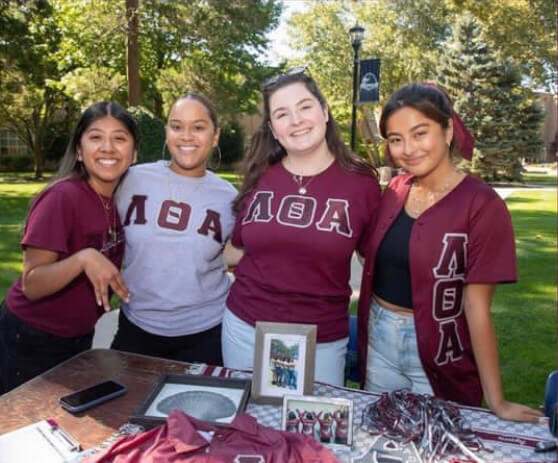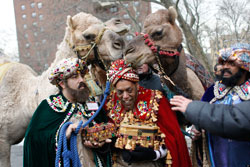When students think of sororities and fraternities, they usually think of those in the National Panhellenic Council, like Phi Sigma Sigma, or those in the Inter-fraternity Council, like Tau Delta Phi. One does not immediately think of the multicultural fraternities and sororities for minority groups around campus.
The Multicultural Greek Council dedicates organizations for people who are Latin American or African American. Although the National Panhellenic Council and Inter-fraternity Council are welcoming to all, coming together as a minority group means more to members.
Alpha Kappa Alpha is a sorority dedicated to African American women on campus. Founded on Jan. 15, 1908 at Howard University in Washington D.C., the Tau Eta chapter at Monmouth was formed on Mar. 27, 2011.
Kayla Kennedy, a May 2022 graduate and last year’s President of Alpha Kappa Alpha, said, “On campus, Alpha Kappa Alpha provides events to educate the campus about the building economic wealth, advocate for social justice, uplift our local community, and to enhance our environment.”
She continued, “The benefits for Black women to join our organization is to build a sisterhood with like-minded women who have a common goal of giving back to the Black community.”
Advocating for one another and having this space to belong with like-minded people is beneficial for those of a minority group. When there is a space to come together, they can share experiences and reflect on each other’s past.
Lambda Theta Alpha is devoted to Latin American women on campus. Founded at Kean University in Union, New Jersey, the Tau chapter formed at Monmouth on Apr. 24, 1994. Here, they work with their local philanthropy, Family Promise of Monmouth County, to help locals in need. Their national philanthropy is St. Jude’s Children’s Research Hospital. The Tau chapter recently took park in a walk on the beach for them.
Like other sororities and fraternities, giving back to the community and raising money for their causes is a main component of what Greek life is all about.
Ariana Connelly, a junior psychology student and president of Lambda Theta Alpha, said, “Inclusion is incredibly important in all aspects of higher education, considering the statistics of first-generation students and students of color that risk leaving college due to feeling left out of their on-campus communities. Greek life has been a way for majority students to further strengthen friendships and specifically, network for future careers and it’s so important that everyone has this opportunity.”
Connelly continued, “That’s why I feel multicultural inclusion in Greek life is so important, especially on a predominantly white campus. Multicultural Greek organizations offer a place for other students to feel welcomed and supported when they need the extra boost.”
Sororities apart of the National Panhellenic Council strive to be inclusive to all. Inclusivity is something Monmouth has been working towards in recent years.
Megan Sternberg, a senior elementary education student and member of Alpha Sigma Tau, said, “Inclusion is one of the most important things to integrate into a campus and campus activities. We attend college with different cultures and making all activities open to them is necessary for a functional campus.”
She continued, “Monmouth draws a student body that is less diverse than other college campuses so for the smaller percentages of students who are from other cultures, it is vital we include them in our activities.”
About 70 percent of Monmouth’s student body is white, about 15 percent is Hispanic, and 5 percent is Black or African American.
Sternberg continued, “Greek life has a lot of stigma around it. People think Greek life is exclusive and not welcoming and looks for one type of person. I think Monmouth should attempt to ditch those stigmas. My sorority does an amazing job of celebrating every type of person we have because we are just happy to be a sisterhood. Our agenda is never to discriminate; we welcome everyone with open arms.”
Although Greek life is not the main focal point on campus, it represents the values of students and is a chance to come together and be passionate about what they support.




